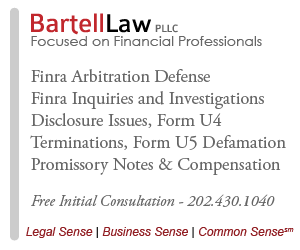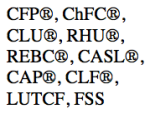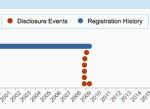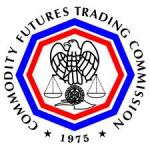Finra Focus – A periodic look at Finra disciplinary actions.

Finra disciplinary settlements sometimes leave the reader feeling sympathetic for the disciplined individual. This happens, for example, where Finra sanctions an advisor for violating a rule, but the advisor did not violate the principles underlying the rules, or cause any harm. This is common with securities rules. Many securities rules prohibit conduct that is merely associated with misconduct, but which may otherwise be entirely innocent or even commendable. As such, it can be difficult to recognize when one is violating such a rule. Examples include rules that require notice, or approval, or a record, or that certain types of procedures be in place.
Finra partially curbs the harshness of such rules when determining the severity of the sanction. The Finra Sanctions Guidelines list mitigating and aggravating factors for various rule violations, which allows for some consideration of the underlying principles, or the extent of any harm caused. Nevertheless, for many Finra rules, a literal violation alone, with no violation of the underlying principles, is enough to support a substantial sanction. And this means a public disclosure of the regulatory action on the individual’s Brokercheck report. In this economy, such disclosures often elicit a knee-jerk refusal by employers to even interview the individual.
A recent Finra settlement with a former NYLife employee may fall into this category. In February 2012, the employee was hired by NYLife Securities and registered with the firm as an Investment Company and Variable Contracts Products representative (think mutual funds and annuities). Just a few months later, the firm terminated the employee:
The company determined that [the employee] was engaged in an outside business activity as a temporary contractor for a bank, performing marketing and advertising services without obtaining prior approval from the company.
Losing her job at NYLife was just the beginning. As required, NYLife filed with Finra a Form U5 termination notice explaining the reason for the termination. This triggered a Finra disciplinary inquiry. The employee recently settled with Finra (by the usual Letter of Acceptance, Waiver and Consent), agreeing to a $5,000 fine and a one-month suspension from association with a Finra member. This is a fairly stiff sanction. Many advisors living paycheck to paycheck don’t have $5,000. And finding a new job in the industry after a one-month regulatory suspension can take a long time. So what exactly did this employee do? The settlement document contains only a few pertinent details:
After joining the Firm, [the employee] accepted a temporary employment position with a bank. From at least March 2012 to June 2012, [the employee] worked at the bank, receiving gross wages of about $20,600 for her services. [The employee], however, did not provide the Firm with prior written notice of this outside business activity. By engaging in an outside business activity without providing the Firm with prior written notice, [the employee] violated FINRA Rules 3270 and 2010.
 The referenced Rule, Finra Rule 3270 (quoted below*) prohibits a registered person from accepting employment outside of their member firm, or from otherwise accepting compensation from an outside business activity, unless the registered person provides prior written notice to the member firm. It is a good example of a rule that can be literally violated, without violating any of its underlying principles or causing harm.
The referenced Rule, Finra Rule 3270 (quoted below*) prohibits a registered person from accepting employment outside of their member firm, or from otherwise accepting compensation from an outside business activity, unless the registered person provides prior written notice to the member firm. It is a good example of a rule that can be literally violated, without violating any of its underlying principles or causing harm.
The Rule’s main purpose is to prevent two types of outside activities. First, those activities that “interfere with or otherwise compromise the registered person’s responsibilities to the member and/or the member’s customers.” And second, those activities that could “be viewed by customers or the public as part of the member’s business based upon, among other factors, the nature of the proposed activity and the manner in which it will be offered.” (See the rule’s supplemental material quoted below**).
So, back to the former NYLife employee. Could the employee be a “sneaky day-lighter“? That is, a person who secretly works two jobs for two different employers during one shift? Maybe selling annuities and mutual funds by phone, while simultaneously creating marketing materials on the computer for the bank, her divided attention shortchanging NYLife and its clients? It’s possible. But it seems unlikely. And nothing in the settlement alleges that her bank job interfered with or compromised her responsibilities to NYLife or its clients. Many people work two jobs and it’s ordinarily considered commendable conduct.
How about the second principle? Could she somehow have been misusing her affiliation with NYLife in her bank job? This too seems unlikely. This tends to come up when an advisor is engaged in an outside activity involving securities, finance or business deals, and the activity’s potential customers are misled into believing that the advisor’s well-established and reputable broker-dealer is somehow participating or supporting the activity. Picture a Morgan Stanley advisor selling limited partnership interests as a side business. He hands out Morgan Stanley business cards, maybe uses a little Morgan Stanley stationary, and keeps reminding everyone he’s with Morgan Stanley. “Hey, Morgan Stanley is involved, what could go wrong?” a potential buyer of a partnership interest might reason. In such cases, the advisor is using the credibility, stability and integrity of the broker-dealer firm to add legitimacy and attractiveness to the outside business activity. It’s hard to imagine how the former NYLife employee could have been doing something like this. She was working for a bank. It seems unlikely that she and the bank were somehow capitalizing on NYLife’s good name. In any event, Finra does not allege that she was misusing her affiliation with NYLife.
![]() So this may indeed be a case of a rule violation — failure to provide notice — without a violation of underlying principles (although we cannot be sure; Finra settled too, and there is no requirement to list every alleged fact; settlements are negotiated). Notice that the rule does not allow the individual to decide whether the activity violates the underlying principles. Instead, it requires that the individual notify the member, so that the member may decide. Failure to notify the member — that is, failure to let the member decide — is the violation. And under Finra’s Sanctions Guidelines, mere failure to provide notice (without any aggravating factors such as customer injury or deliberate concealment) is punishable by a suspension of up to 30 business days.
So this may indeed be a case of a rule violation — failure to provide notice — without a violation of underlying principles (although we cannot be sure; Finra settled too, and there is no requirement to list every alleged fact; settlements are negotiated). Notice that the rule does not allow the individual to decide whether the activity violates the underlying principles. Instead, it requires that the individual notify the member, so that the member may decide. Failure to notify the member — that is, failure to let the member decide — is the violation. And under Finra’s Sanctions Guidelines, mere failure to provide notice (without any aggravating factors such as customer injury or deliberate concealment) is punishable by a suspension of up to 30 business days.
Outside business activities can be a trap for the unwary. An advisor may be engaged in an entirely ethical, even commendable activity, and yet still find himself sanctioned by Finra. Learning the rules, and developing a sensitivity to areas that pose regulatory risk, is really the only way to ensure a long career free from regulatory sidetracking. In the holiday spirit, FinanciallyRegulated hopes this former NYLife employee lands on her feet after the suspension.
* 3270. Outside Business Activities of Registered Persons
No registered person may be an employee, independent contractor, sole proprietor, officer, director or partner of another person, or be compensated, or have the reasonable expectation of compensation, from any other person as a result of any business activity outside the scope of the relationship with his or her member firm, unless he or she has provided prior written notice to the member, in such form as specified by the member. Passive investments and activities subject to the requirements of NASD Rule 3040 shall be exempted from this requirement.** .01 Obligations of Member Receiving Notice. Upon receipt of a written notice under Rule 3270, a member shall consider whether the proposed activity will: (1) interfere with or otherwise compromise the registered person’s responsibilities to the member and/or the member’s customers or (2) be viewed by customers or the public as part of the member’s business based upon, among other factors, the nature of the proposed activity and the manner in which it will be offered. Based on the member’s review of such factors, the member must evaluate the advisability of imposing specific conditions or limitations on a registered person’s outside business activity, including where circumstances warrant, prohibiting the activity. A member also must evaluate the proposed activity to determine whether the activity properly is characterized as an outside business activity or whether it should be treated as an outside securities activity subject to the requirements of NASD Rule 3040. A member must keep a record of its compliance with these obligations with respect to each written notice received and must preserve this record for the period of time and accessibility specified in SEA Rule 17a-4(e)(1).
Published by Jeremy L. Bartell
 Financially Regulated is published by Jeremy L. Bartell, a long-time admirer of Wall Street and its interesting cast of regulators. Jeremy is an attorney with Bartell Law in Washington D.C. He represents financial professionals nationwide in Finra inquiries and investigations, Finra arbitration, securities employment disputes and registration and disclosure matters.
Financially Regulated is published by Jeremy L. Bartell, a long-time admirer of Wall Street and its interesting cast of regulators. Jeremy is an attorney with Bartell Law in Washington D.C. He represents financial professionals nationwide in Finra inquiries and investigations, Finra arbitration, securities employment disputes and registration and disclosure matters.
























Okay the second job or outside activity was not delivering pizzas, working at a farmers market, or Ebaying StarWars toys.
This person worked at a bank or bank affiliate in some capacity. Bank = financial industry, and what is this guideline/rule for if not to monitor licensed persons financial doings?
I see your point MH, thanks for the comment. The pizza delivery job also requires prior approval by the broker-dealer. There is no exception for non-financial industry jobs. And since we do not know the details of her gig at the bank, we cannot say whether she was really doing a financial job – it was described only as a temporary marketing and advertising job. She could have been doing activities with no significant financial connection. And it seems it doesn’t matter if she was or not: the failure to disclose the job to the broker-dealer is the violation. I would hope a similar case involving a pizza-deliver job would be treated more leniently, but it’s the same violation. Failure to disclose and get approval. In the case above, nothing beyond the fact of failure to disclose is mentioned. No attempt was made to tie her conduct into the concerns of 3270.01.
Okay, So as long as it was disclosed to the broker dealer and the clients. The person could have essential had two full-time jobs without violating FINRA?
Yes, except disclosure to clients is not required. Only to the broker-dealer. And it must be before one engages in the outside activity. The broker-dealer has an opportunity to deny it, if it wants.